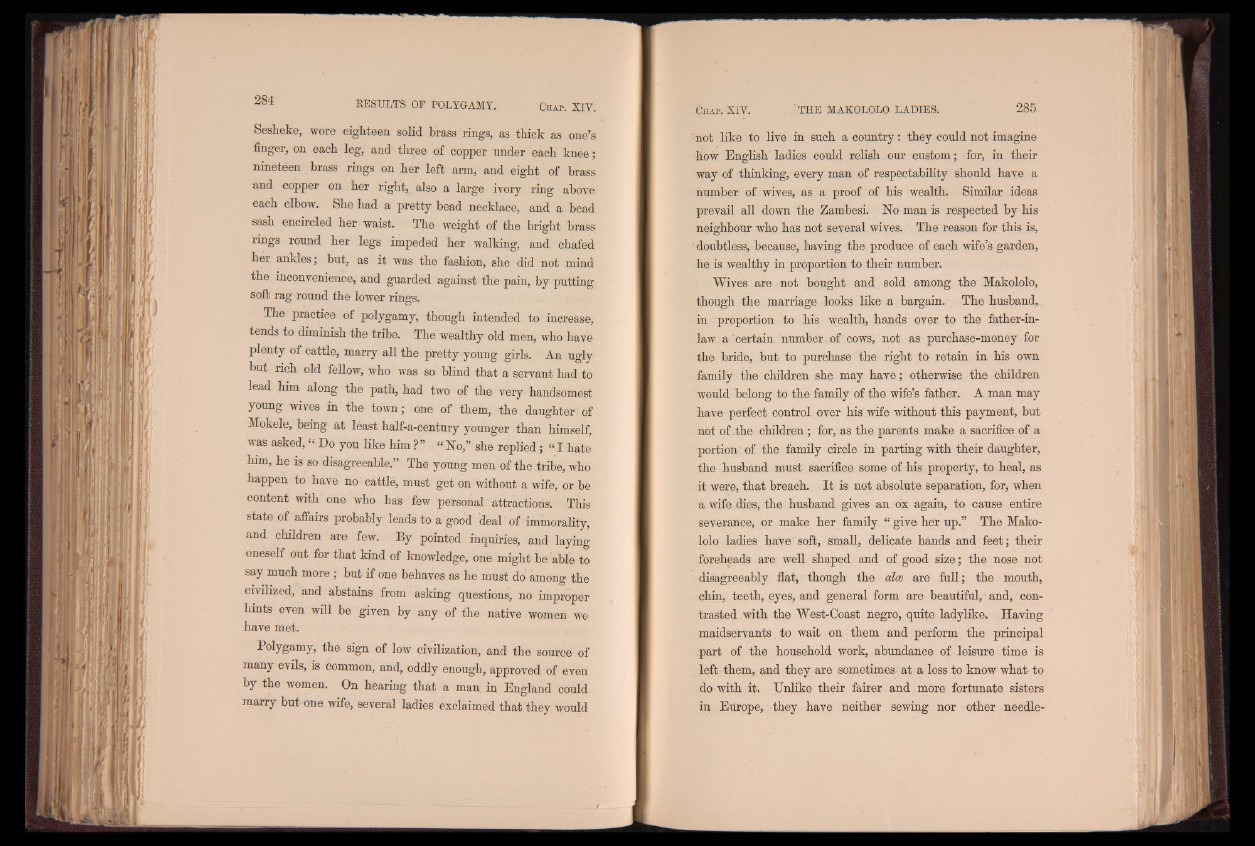
Sesheke, wore eighteen solid brass rings, as thick as one’s
finger, on each leg, and three of copper under each knee;
nineteen brass rings on her left arm, and eight of brass
and copper on her right, also a large ivory ring above
each elbow. She had a pretty bead necklace, and a bead
sash encircled her waist. The weight of the bright brass
rings round her legs impeded her walking, and chafed
her ankles; but, as it was the fashion, she did not mind
the inconvenience, and guarded against the pain, by putting
soft rag round the lower rings.
The practice of polygamy, though intended to increase,
tends to diminish the tribe. The wealthy old men, who have
plenty of cattle, marry all the pretty young girls. An ugly
but rich old fellow, who was so blind that a servant had to
lead him along the path, had two of the very handsomest
young wives in the town; one of them, the daughter of
Mokele, being at least half-a-century younger than himself,
was asked, “ Do you like him ?” “ No,” she replied; “ I hate
him, he is so disagreeable.” The young men of the tribe, who
happen to have no cattle, must get on without a wife, or be
content with one who has few personal attractions. This
state of affairs probably leads to a good deal of''immorality,
and children are few. By pointed inquiries, and laying
oneself out for that kind of knowledge, one might be able to
say much more; but if one behaves as he must do among the
civilized, and abstains from asking questions, no improper
hints even will be given by any of the native women we
have met.
Polygamy, the sign of low civilization, and the source of
many evils, is common, and, oddly enough, approved of even
by the women. On hearing that a man. in England could
marry but one wife, several ladies exclaimed that they would
not like to live in such a country: they could not imagine
how English ladies could relish our custom; for, in their
way of thinking, every man of respectability should have a
number of wives, as a proof of his wealth. Similar ideas
prevail all down the Zambesi. No man is respected by his
neighbour who has not several wives. The reason for this is,
doubtless, because, having the produce of each wife’s garden,
he is wealthy in proportion to their number.
Wives are not bought and sold among the Makololo,
though the marriage looks like a bargain. The husband,
in proportion to his wealth, hands over to the father-in-
law a certain number of cows, not as purchase-money for
the bride, but to purchase the right to retain in his own
family the children she may have; otherwise the children
would belong to the family of the wife’s father. A man may
have perfect control over his wife without this payment, but
not of .the children ; for, as the parents make a sacrifice of a
portion of the family circle in parting with their daughter,
the husband must sacrifice some of his property, to heal, as
it were, that breach. I t is not absolute separation, for, when
a wife dies, the husband gives an ox again, to cause entire
severance, or make her family “ give her up.” The Makololo
ladies have soft, small, delicate hands and feet; their
foreheads are well shaped and of good size; the nose not
disagreeably flat, though the aloe are full; the mouth,
chin, teeth, eyes, and general form are beautiful, and, contrasted
with the West-Coast negro, quite ladylike. Having
maidservants to wait on them and perform the principal
part of the household work, abundance of leisure time is
left them, and they are sometimes at a loss to know what to
do with it. Unlike their fairer and more fortunate sisters
in Europe, they have neither sewing nor other needle